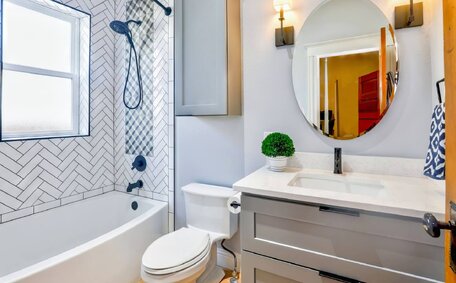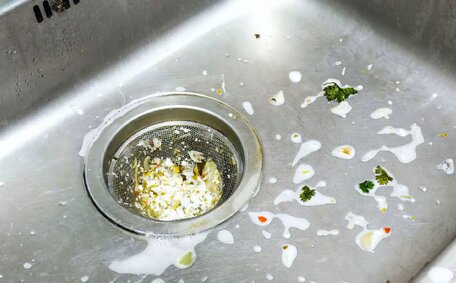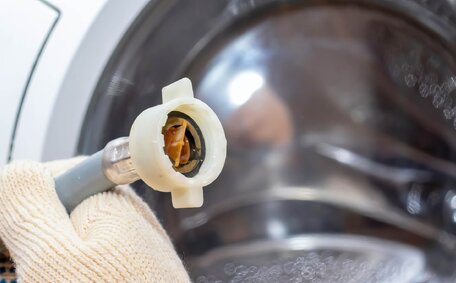What Causes Calcium Buildup in Pipes
Calcium buildup pipes is primarily caused by hard water can contain high levels of minerals like calcium, magnesium, and potassium. As hard water circuits through your plumbing system, minerals can precipitate and start building up inside your pipes, eventually causing significant scale.
Some signs that your home may have hard water, akin to frequent disposal of cooking oil, causing calcium buildup include:
- White/chalky mineral deposits around your sink and faucets
- Reduced water flow or pressure
- Stains on dishes, utensils, and the toilet bowl
- Soap scum that stubbornly finds its way onto your blocked fixtures
Water tests can confirm levels where hard water your system can contribute to scale formation. A blocked drain can escalate from small accumulations to severe obstructions, leading to reduced water flow, leaks, and costly plumbing repairs if left untreated.
How Calcium Buildup Affects Your Plumbing
Calcium buildup in pipes can cause a variety of issues for buildup your plumbing system over time if left untreated:
- Reduced water flow - Scale causes a decrease in pipe diameters, which can limit water flow to fixtures.
- Increased risk of clogs - Calcium deposits can break down and accumulate, leading to damage your plumbing system might face.
- High pressure - With restricted pipe space, the increased pressure water puts stress on pipe walls.
- The need to repair replace components may become imminent as leaks and bursts occur - The added stress can also cause pipes to fail at connections or weak spots.
- Noisy pipes - Mineral deposits disrupt flow water patterns, causing pipes to rattle.
- Higher energy bills - Your water heater works harder due to reduced hot water flow inside your system.
Severely clogged pipes can make it imperative to employ a drain snake or prompt the need for pipe replacement. Preventing calcium buildup in your pipes, which we can conduct pipe repair and install protective measures against, is ideal.
Pipe lining, however, provides an effective repair method that coats old piping with new epoxy resin to seal leaks, fill cracks, and smooth surfaces. Regular maintenance of your drains, descaling fixtures, Choosing to install a water softener, and upgrading old pipes help minimise scale accumulations over time.
Identifying Signs of Calcium Buildup
There are common signs of a blocked drain by scales or debris, potentially indicating calcium buildup in your home’s plumbing:
- Reduced water flow - You may notice lower than normal water pressure or flow rates from faucets and showerheads as scale buildup narrows pipe interior dimensions.
- Visible mineral deposits - White, chalky buildup around plumbing fixtures, particularly at the sink drain or on metal piping.
- Staining - Rusty, yellow, or brown staining of porcelain fixtures or laundry.
- Slow draining - Blockages caused by broken blocked scale fragments can gradually reduce drain efficiency.
- Noisy pipes - Sounds like chattering or rattling pipes as water flows around calcium deposits.
Catching calcium buildup early provides comfort to people who seek more plumbing repair options; our team is ready to advise and assist. Our team of experienced technicians can properly diagnose issues and provide solutions to cost-effectively restore flow.
The Problems Caused by Calcium Buildup
If left unchecked, calcium buildup in pipes can lead to a number of serious plumbing issues:
- Blocked drains - Breakaway pieces of scale buildup can accumulate and clog pipes, frequently leading to blocked drains and sewer lines.
- Plumbing leaks - The added stress on damaged pipes from internal sewer stormwater scale buildup can result in cracks and pinhole leaks in plumbing.
- Expensive repairs - Severely clogged sewer pipes, which can affect the entire system, may need to be snaked or undergo hydro jetting, while extensively damaged sections require expensive replacement.
- Appliance damage - Buildup creeping into your pipes supplying appliances like hot water heaters and washing machines can reduce flow, forcing them to work harder and minimising their lifespan.
- Water contamination - Corroded pipes with lead, copper or iron buildup can leach toxic minerals back into household water as the internal scale dissolves over time.
By promptly addressing calcium buildup with pipe relining, you mitigate emergency blockages that could be as stubborn as sanitary products, thus reducing health and financial risks. Our team is here to help diagnose issues and get everything flowing smoothly again.
How Pipe Relining Prevents Future Calcium Buildup
Pipe relining provides an effective barrier inside pipes that stops additional calcium and mineral deposits from forming. The process involves inserting a resin-saturated felt liner into pipes and curing it with hot water or steam to harden. This creates a protective epoxy layer that allows water to move seamlessly through pipes, preventing corrosion and chemical deterioration.
With pipe relining, we restore pipes without changing the internal diameter, and it stays the same or is even slightly increased, maintaining normal water flow rates. The epoxy coating prevents scale buildup, ensuring the water flow is carried out freely over time. Most standard relining products, including our blueline, come with a 10-20 year manufacturer warranty covering this protective layer.
Properly applied pipe relining can also resist mineral deposits significantly longer than traditional piping. Over an estimated 50+ year service life, relined pipes help avoid scale accumulations, blocked drains, and reduced water pressure issues. When plumbing issues eventually arise again decades down the road, pipes can simply be re-lined instead of replaced.
This also reduces strain on water-based appliances.
In some cases, partial calcium buildup in your pipes may remain inside pipes even after relining. While water flows smoothly over this hardened residual buildup, supplements like descaling solutions or water softeners can help tackle the buildup pipes can retain, slowly if desired over time.
The Pipe Relining Process Explained
The pipe relining process utilises trenchless pipe technology to repair existing pipes and prevent future calcium buildup. Here is an overview of the key steps involved:
Inspection
First, our technicians use CCTV cameras to thoroughly inspect the interior of pipes. This allows us to identify any problem areas or defects, assess the extent of any calcium deposits, and determine if the pipes are suitable candidates for relining.
Cleaning & Preparation
We use highpressure water jets to clean out the pipes and remove calcium buildup including loose debris or existing scale. This prepares the pipes for the next steps by smoothing the interior surfaces.
Resin Saturation
We saturate a felt liner with a special 2-part epoxy resin designed to prevent future drain clogs. This flexible liner is then pulled or inflated into pipe, coating the interior completely with the liquid resin as it makes contact.
Curing & Hardening
We apply pressurised steam or hot water to ensure the resin-saturated liner is properly cured place and hardens. As it cures, the material bonds firmly to the host pipe walls. The resin transforms into a smooth, jointless epoxy barrier.
Cool Down & Finishing
We cool and set the newly installed epoxy liner before reconnecting all plumbing fixtures. The pipes now have improved flow capacity and long-term protection against scale deposits and leaks. We offer manufacturer warranties up to 20 years on standard pipelining products.
Our experienced, licenced pipe relining professionals expertly clear blocked sections, ensuring minimal disruption to your property. We restore problem pipes to better than new condition without the mess and expense of traditional pipe replacements.
DIY Alternatives for Minor Calcium Buildup
For minor calcium buildup issues, there are some DIY methods you can try to counteract hard water which drain can benefit from before calling a professional:
Vinegar
White vinegar is effective when you water pour it into your piping system, as it naturally breaks down calcium deposits. Pour 1-2 cups down affected drains to get rid of calcium deposits, let sit for 30 minutes, then rinse with boiling water. Repeat weekly.
Baking Soda and Vinegar
Mixing soda vinegar yields a fizzing reaction that helps to dissolve stubborn calcium deposits. Pour down your drain, let sit 30 minutes, this process provides a way to remove further debris, then rinse.
Lemon Juice
The acidity in lemon juice also dissolves calcium deposits. Squeeze juice from 5-6 lemons down the drain, let sit 1 hour, then rinse.
While useful to mitigate calcium for minor buildup, these methods provide temporary relief and are preferable to caustic cleaners, but do not address underlying issues. Significant or recurring calcium blockages and issues can require professional drain evaluations and structural repairs like pipe relining to fully resolve.
When to Call a Professional Plumber
You should call a professional plumber in situations where calcium buildup causes persistent or recurring issues that you cannot resolve on your own, such as:
- Complete drain blockages - DIY drain treatments are only temporary fixes. If you have a fully blocked drain or your sewer line that remains clogged after multiple attempts to clear it, call us.
- Reduced water flow at multiple fixtures - Noticeably low water pressure or flow rates throughout your home likely indicate widespread pipe narrowing from scale buildup. This requires complete system service.
- Large calcium deposits - Extensive mineral buildup around fixtures or along sections of exposed piping signals advanced accumulation within pipes also. Professional cleaning and relining is needed to remove deposits and prevent more.
- Frequent issues - If problems such as tree roots invasion in your plumbing system reappear soon after DIY treatments, the underlying cause is not resolved. Our specialists can diagnose and treat the source of recurring clogs or flow loss.
- Leaks, cracks or pipe damage - Any signs of leaks or physical pipe deterioration require immediate professional help to prevent water damage and make structural repairs.
For comprehensive plumbing service, including professional drain cleaning or affordable pipe relining in the Burwood area, contact our team at 1300 349 338 or jobs@burwoodplumbingservices.com.au. Our family owned team of licenced, insured plumbers and electrical plumbing specialists are equipped to handle calcium buildup issues within any type of drain sewer system of any severity.
Preventing Calcium Buildup in Your Pipes
There are several effective preventative measures you can take to avoid calcium buildup in pipes:
Install a Water Softener
A water softener system, which we can install, removes minerals like calcium and magnesium from your home’s water supply through a process called ion exchange. Soft water can help prevent scale accumulation inside pipes and extends the life of water-based appliances.
Use Filtered or Bottled Water
Using filtered tap water for cooking and drinking bypasses your home’s hard water pipes. This limits mineral exposure to household plumbing.
Insulate Pipes
Insulating hot water pipes maintains consistent temperatures, reducing mineral precipitation from hot-to-cold cycles that accelerate buildup.
Routinely Descale Fixtures
Regularly descaling showerheads, sink aerators, and other fixtures can help prevent minor calcium deposits before major accumulation occurs.
Upgrade Old Pipe Types
Substituting older clay concrete pipes, especially those leading to your sewer line, with advanced copper or PEX piping can significantly resist corrosion and scale.
In most regions with hard water, some calcium accumulation is inevitable over time. But taking preventative steps can significantly slow buildup, reducing the need for repairs down the road.






